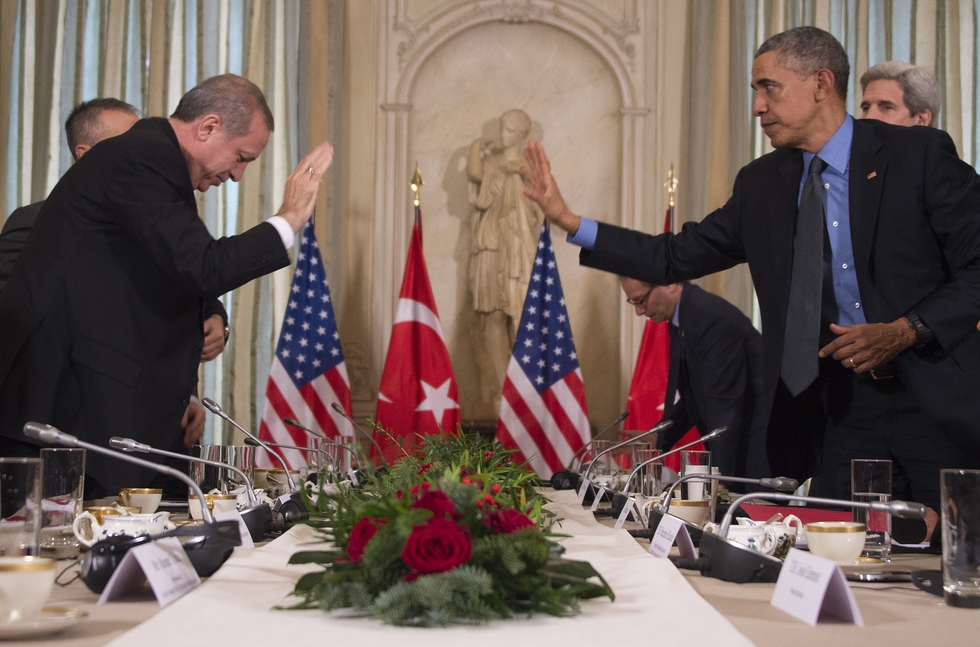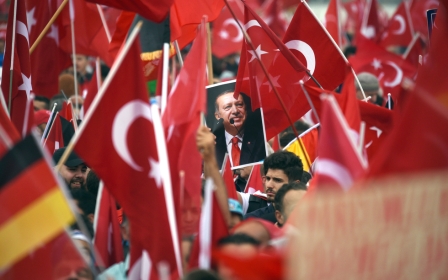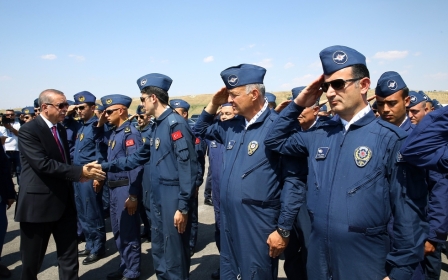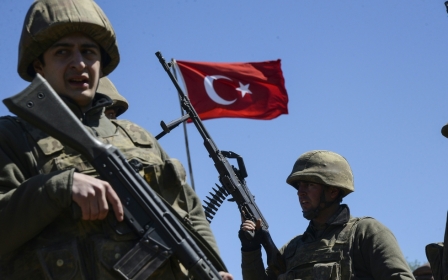US-Turkey military fissures could damage anti-Islamic State efforts

NEW YORK, United States – As the United States sought to limit the fallout from a purge of Turkey’s military on Monday, security experts warned of troubles in the NATO alliance, the battle against the Islamic State (IS) group and refugee flows into Europe.
Speaking with Middle East Eye, former US government officials – one-time US ambassador to Ankara, W Robert Pearson, and Larry Korb, former US assistant secretary of defence – said that Turkey’s military purge is straining a key military relationship.
Korb, who administered about 70 percent of US defence spending in the early 1980s, said a “large number” of US military liaisons have seen their Turkish counterparts dismissed in the purge. Building up trust with their replacements will take time.
The Turkish army’s ability to perform day-to-day functions – such as tackling IS, guarding the Turkey-Syria border and stopping Europe-bound refugee flows – will be tested by the sacking of some 40 percent of Turkey’s military leaders, Korb said.
“How good will their armed forces be? To get them to the effectiveness that they had before the coup will take at least a decade. Training new leaders to perform effectively, it doesn’t happen overnight,” Korb said.
Pearson, who served in Ankara from 2000-03, said that day-to-day cooperation between Turkish and US forces, including anti-IS efforts in Syria and Iraq, had continued relatively smoothly since the coup despite a “new high” in tensions.
“The short-term impact is unavoidable, but the long-term question is: Will these two countries find a good way to cooperate against IS, the threat of which has probably increased and therefore is more urgent?” asked Pearson.
Turkey vital to anti-IS efforts
Turkey, the second largest military in NATO after the US, is vital in anti-IS efforts thanks to its long border with Syria, although Ankara has been more focussed on defeating President Bashar al-Assad’s government than the religious fighters.
Pearson and Korb spoke to MEE on Monday, as America’s top military officer, chairman of the US Joint Chiefs of Staff Gen Joseph Dunford, was in Ankara, working to soothe ties with Turkey and limit the damage from the abortive coup on 15 July.
General Dunford “wouldn’t be there unless it was a very serious issue of relations between the two countries and the military cooperation in Syria. That itself is a signal to the Turks that we take their views quite seriously,” Pearson told MEE.
Some 150 protesters marched on the US embassy in Ankara on Monday to protest the visit of Gen Dunford, the main military adviser to the US president, who met his Turkish military counterpart and Prime Minister Binali Yildirim.
“Dunford go home. Send us Fethullah,” said one banner, referring to US-based Turkish cleric Fethullah Gulen, whose network of followers in the military and state bodies are blamed by Turkey’s leaders for carrying out the coup.
The 75-year-old cleric, who has lived in self-imposed exile in Pennsylvania since 1999, denies any role in the insurrection. President Barack Obama has said Washington will only extradite him if Ankara provides proof of wrongdoing.
Crackdown raises alarm
Western critics say Turkish President Tayyip Erdogan’s crackdown goes far beyond the coup-plotters and is aimed at all opponents. Ankara rejects such censure and is angered by an apparent US reluctance to hand over Gulen.
More than 230 people were killed last month as rebel soldiers commandeered tanks, jets and helicopters in a bid to seize power. More than 60,000 people in the military, judiciary, civil service and education have since been detained, suspended or are being probed.
The scale of the purges, which have seen some 40 percent of admirals and generals sacked, along with suggestions from officials that the death penalty may be reintroduced, have raised alarm about a country with plans to join the European Union.
Some 1,400 more armed forces members were dismissed and the top military council was stacked with government ministers on Sunday, moves designed by Erdogan to tighten his control over the military – once a bastion of secularism in an increasingly-religious country.
“Our aim is that we set up such a system that nobody within the armed forces would ever consider a coup again,” Deputy Prime Minister Numan Kurtulmus told a news conference on Monday. A restructuring of intelligence bodies may follow, he said.
The new wave of army expulsions and the overhaul of the Supreme Military Council, announced on Sunday, came hours after Erdogan said he planned to put the armed forces under the control of the Defence Ministry and shut down military academies.
Among those arrested was the commander of the 10th Tanker Base Command at Incirlik Air Base, which is used by Turkish and US forces in the anti-IS air campaign. Turkish commanders working within NATO were also detained.
Erdogan silencing critics?
According to a report by Jennifer Cafarella, from the Institute for the Study of War, a Washington-based research group, Erdogan’s purge aims to silence critics and turn the military into a “source of personal power”.
Erdogan is bolstering the police force, which helped defeat the coup forces, and rewarding those commanders who remained loyal to him with promotions as he reshapes “Turkey’s foreign policy away from US interests,” the report said.
He seeks stronger ties with Russia, which is under western sanctions, and will meet with President Vladimir Putin on August 9. US policymakers must “brace for the new reality that America’s alliance with Turkey is not guaranteed,” the report said.
According to Korb, the post-coup backlash marks Turkey’s shift away from the secular, democratic values that underpinned the country in the 20th Century and towards an Islamist autocracy under Erdogan.
“Twenty years ago, there were two models for Muslim countries: Turkey’s secular model and Iran’s religious model. We don’t have that anymore. As Erdogan moves in this direction, what is the future of governments in that region? Which model will they follow?” Korb told MEE.
Middle East Eye propose une couverture et une analyse indépendantes et incomparables du Moyen-Orient, de l’Afrique du Nord et d’autres régions du monde. Pour en savoir plus sur la reprise de ce contenu et les frais qui s’appliquent, veuillez remplir ce formulaire [en anglais]. Pour en savoir plus sur MEE, cliquez ici [en anglais].




